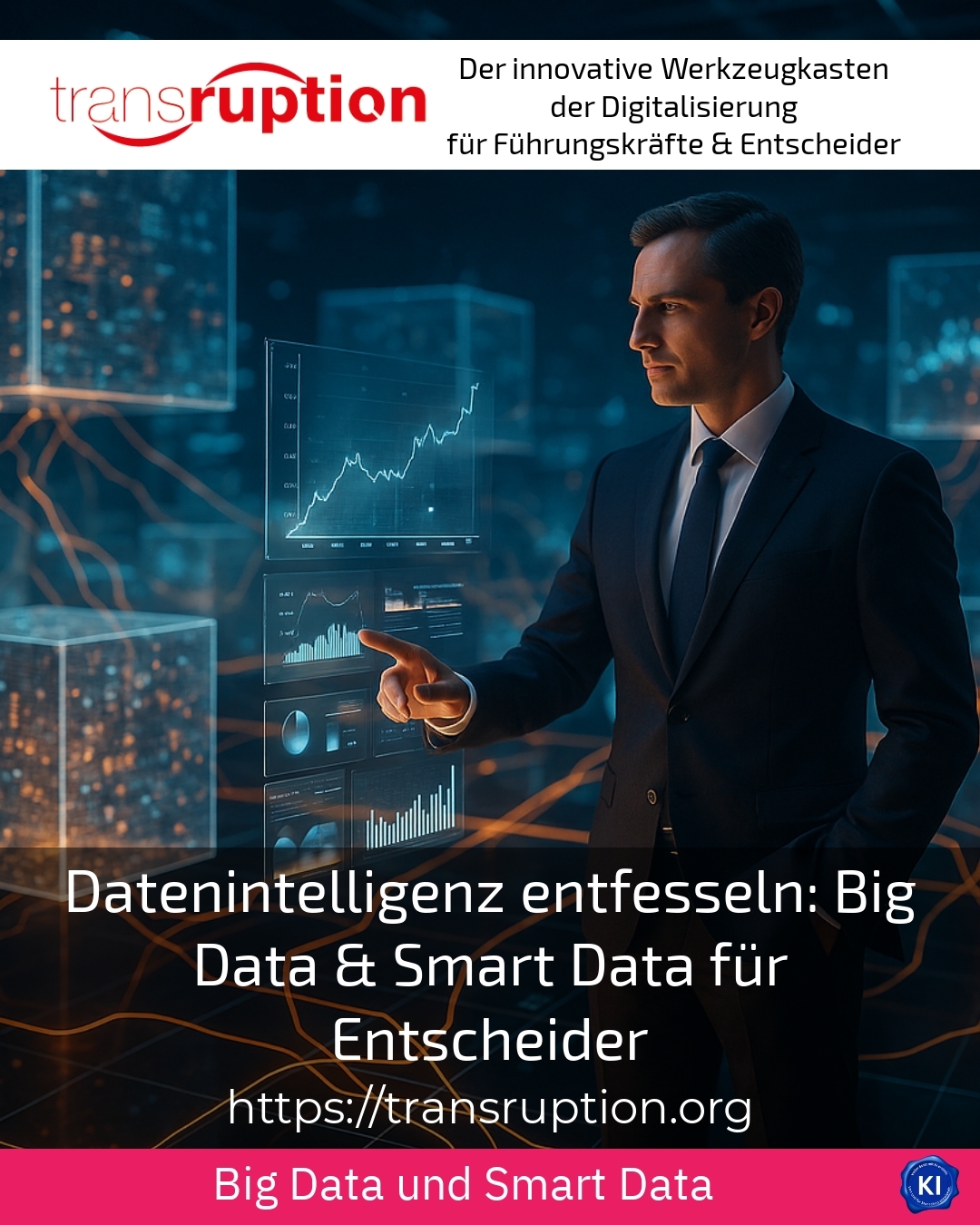Data intelligence is becoming increasingly important because companies have to deal with constantly growing volumes of data. It is no longer just about the sheer volume of information, but about how this data can be used intelligently. In this context, the focus is on big data and smart data in order to provide decision-makers with relevant insights and recommendations for action. Data intelligence helps to gain valuable insights from the mass of raw data.
Big data and smart data - the basis for sustainable decisions
Big data describes very large and heterogeneous data sets that come from a wide variety of sources. Typical characteristics are volume, speed and variety. A production plant, an online shop or an insurance company generate enormous amounts of data every day. For example, a factory records numerous sensor data on temperature, pressure or running times, and an online retailer collects user data, purchase histories and click behaviour. Big data provides comprehensive information that first needs to be sorted and categorised.
Smart data is filtered, quality-assured information that is specifically tailored to the needs of the company. This means that big data is analysed and relevant data is extracted in order to obtain specific, useful insights. For example, a logistics service provider could filter out only the data that signals delays in the transport process from its large pool of data - allowing processes to be improved in a targeted manner.
This creates data intelligence that enables much more precise decisions to be made and resources to be deployed in a targeted manner. While big data creates an enormous database, smart data puts this information into a context that helps decision-makers to take action.
Utilising data intelligence: Practical examples from the industry
Many companies are faced with the challenge of utilising big data sensibly. Data intelligence supports this process by providing impetus and facilitating the handling of data. Three application examples from different industries show how this can be achieved:
1 An automotive manufacturer uses sensor data from production to recognise quality deviations at an early stage. The amount of data is immense, but data intelligence allows the company to filter out only the relevant information and make quick corrections.
2 In the financial sector, a credit institution analyses transaction data to identify fraudulent activities. Instead of checking all data unfiltered, smart data is used to focus on patterns that indicate typical fraudulent behaviour.
3 A retail company uses data intelligence to better understand the purchasing behaviour of customers. This creates personalised offers based on actual needs, which increases customer satisfaction and sales.
BEST PRACTICE at company XYZ (name changed due to NDA contract): The introduction of a data-intelligent platform enabled production control to be optimised. The intelligent filtering of sensor data enabled more precise predictions of maintenance requirements and significantly reduced downtimes. The company reports significantly increased efficiency despite growing data volumes.
Challenges and how data intelligence supports
Misinterpretation and information overload are common problems, especially with large amounts of data. Decision-makers often report that although they have a lot of data at their disposal, they are barely able to extract the relevant essence from it. Data intelligence helps to set the focus and create clarity. We do this by developing customised analysis models and by supporting the integration of data strategies in companies.
Another aspect is data quality: data cleansing and validation processes ensure that decisions are based on reliable information. This is also a central component of data intelligence that creates trust in the use of big data.
Data intelligence and digital transformation: an interplay
Many digitalisation projects fail due to a lack of access to relevant data or because it is not used correctly. Data intelligence helps companies to successfully implement digitalisation projects. Among other things, it provides support in selecting the right data sources, training employees and establishing a data-driven corporate culture.
For example, a medium-sized mechanical engineering company implemented a data-intelligent system for maintenance planning. The software continuously analyses machine data and provides early maintenance information. This reduces unplanned downtime and allows resources to be utilised more efficiently. This is a classic case of how data intelligence creates immediate added value.
BEST PRACTICE at company XYZ (name changed due to NDA contract): Following the introduction of a data-intelligent reporting tool, the sales department was able to respond to customer needs in a more targeted manner. Clear visualisation of the relevant KPIs improved the speed of decision-making. The sales managers praise the greater transparency and the associated competitive advantage.
Overall, it can be observed that data-intelligent approaches are particularly successful when they are understood as an integral part of change processes. The interplay between technology, people and organisation plays a central role in this.
My analysis
Data intelligence is becoming a decisive factor for companies that want to utilise big data effectively. It supports decision-makers in extracting valuable information from the wealth of raw data. The combination of analytical expertise and practice-orientated implementation ensures that data-driven projects achieve sustainable success. By focussing on quality and relevance, data intelligence helps to better secure decisions and exploit opportunities in the digital transformation.
It is important to recognise that data-intelligent solutions should always be adapted to the individual needs and circumstances of a company. The combination of big data and smart data creates the foundation for efficient, adaptable and future-proof business models.
Further links from the text above:
Difference Between Big Data and Smart Data - Esa Automation
Big Data and Data: Key Differences, Benefits, and Best Practices
Big Data vs. Smart Data: Key Insights for Operational Optimisation
Big Data vs. Smart Data: Valuable Insights to Optimise ... - MaintainX
Big Data vs. Smart Data: Is More Always Better? - Netconomy
Big data vs. smart data - DATAVERSITY
For more information and if you have any questions, please contact
Contact us or read more blog posts on the topic
TRANSRUPTION here.
















